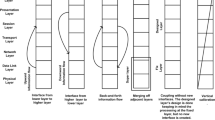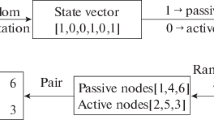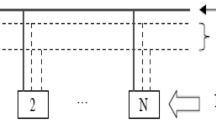Abstract
We propose an Election based Hybrid Channel Access (EHCA) protocol for ad hoc network to achieve high throughput and bounded channel access delay at the same time. EHCA reduces the contentions during the channel scheduling formation through fair node elections, which are based on the topology information. Only the elected nodes contend for the channel and broadcast the scheduling result. Numerical analysis and simulation results show that EHCA outperforms alternative designs.
This work was supported in part by the Baskin Chair of Computer Engineering at UCSC, the National Science Foundation under Grant CNS-0435522, and the U.S. Army Research Office under grant No.W911NF-041-1-0224. Any opinions, findings, and conclusions are those of the authors and do not necessarily reflect the views of the funding agencies.
Chapter PDF
Similar content being viewed by others
Keywords
These keywords were added by machine and not by the authors. This process is experimental and the keywords may be updated as the learning algorithm improves.
References
Arikan, E.: Some Complexity Results about Packet Radio Networks. IEEE Transactions on Information Theory 30(4), 681–685 (1984)
Bao, L.: MALS: Multiple Access Scheduling Based on Latin Squares. In: IEEE MILCOM 2004, October 31-November 3, 2004, IEEE Computer Society Press, Los Alamitos (2004)
Bao, L., Garcia-Luna-Aceves, J.J.: A New Approach to Channel Access Scheduling for Ad Hoc Networks. In: ACM Seventh Annual International Conference on Mobile Computing and networking (Mobicom), Rome, Italy, ACM Press, New York (2001)
Chlamtac, I., Farago, A.: Making Transmission Schedules Immune to Topology Changes in Multi-hop Packet Radio Networks. IEEE/ACM Transactions on Networking 2(1), 23–29 (1994)
Gupta, P., Kumar, P.R.: The Capacity of Wireless Networks. IEEE Trans. on Inf. Theory 46, 388–404 (2000)
IEEE Standard for Wireless LAN Medium Access Control (MAC) and Physical Layer (PHY) Specifications (Nov. 1997)
Ju, J.-H., Li, V.O.K.: An Optimal Topology-Transparent Scheduling Method in Multi-hop Packet Radio Networks. IEEE/ACM Transactions on Networking 6(3), 298–306 (1998)
Oikonomou, K., Stavrakakis, I.: Analysis of a Probabilistic Topology-Unaware TDMA MAC Policy for Ad-Hoc Networks. IEEE JSAC, Special Issue on Quality-of-Service Delivery in Variable Topology Networks 22(7), 1286–1300 (2004)
Perkins, C., Belding-Royer, E., Das, S.: RFC 3561- Ad hoc On-Demand Distance Vector (AODV) Routing (Jul. 2003)
Qualnet Simulator. Scalable Network Technologies, http://www.scalable-networks.com/
Rentel, C.H.: Network Time Synchronization and Code-based Scheduling for Wireless Ad Hoc Networks. Ph.D. Thesis, Carleton University (January 2006)
Socolofsky, T., Kale, C.: RFC 1180 - A TCP/IP Tutorial (Jan. 1991)
Tang, Z., Garcia-Luna-Aceves, J.J.: A Protocol for Topology-Dependent Transmission Scheduling. In: Proceedings of IEEE Wireless Communications and Networking Conference (WCNC), New Orleans, September 21-24, 1999, IEEE Computer Society Press, Los Alamitos (1999)
Author information
Authors and Affiliations
Editor information
Rights and permissions
Copyright information
© 2007 IFIP International Federation for Information Processing
About this paper
Cite this paper
Wang, X., Garcia-Luna-Aceves, J.J. (2007). Election Based Hybrid Channel Access. In: Akyildiz, I.F., Sivakumar, R., Ekici, E., Oliveira, J.C.d., McNair, J. (eds) NETWORKING 2007. Ad Hoc and Sensor Networks, Wireless Networks, Next Generation Internet. NETWORKING 2007. Lecture Notes in Computer Science, vol 4479. Springer, Berlin, Heidelberg. https://doi.org/10.1007/978-3-540-72606-7_6
Download citation
DOI: https://doi.org/10.1007/978-3-540-72606-7_6
Publisher Name: Springer, Berlin, Heidelberg
Print ISBN: 978-3-540-72605-0
Online ISBN: 978-3-540-72606-7
eBook Packages: Computer ScienceComputer Science (R0)




